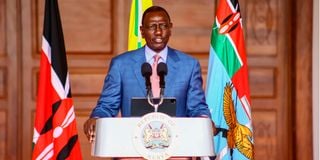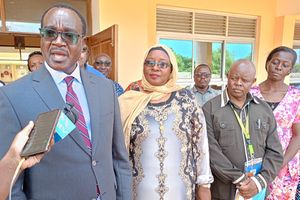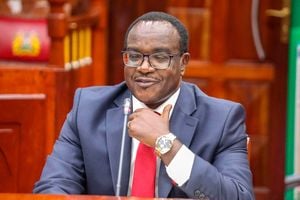
President William Ruto.
A meeting held at State House failed to convince at least 100 university student leaders to endorse President William Ruto’s new higher education funding model, the Nation has learnt.
This came as reports emerged that each attendee pocketed Sh25,000 as ‘facilitation’ fee at the end of the talks following uproar over categorising of students for university scholarships and loans in the new system.
State House Spokesperson Hussein Mohammed confirmed the meeting took place but told Nation.Africa he was not aware of any such payments.
The talks did not appear to have met their objectives with the students who attended saying their concerns were not properly addressed.
Five-hour discussion
At least 100 student leaders drawn from different universities across the country attended the five-hour meeting at State House on August 21, which started at 4pm and ended around 9pm.
Apart from President Ruto, other top officials who were present included Higher Education Principal Secretary Beatrice Inyangala and her Interior counterpart Raymond Omollo.
Mr Evans Serem, the Vice President of Kabarak University students’ association, was among the few who posted on social media about the seemingly hush-hush event.
State House and President Ruto did not post photographs or details about the meeting on their official social media accounts. However, photographs of some of the student leaders posing have been circulated online.
The talks came days after a previous meeting held at the Kenya School of Government with the students ended unceremoniously.
The previous meeting, like Wednesday’s at State House, was about the controversial university funding model rolled out after the Kenya Kwanza administration came to power.
Hush-hush
So secretive was the meeting that most of the vice-chancellors did not know that their students were invited to State House with some sources also claiming that the invited group was well-selected.
It was said to have been an open meeting where those present freely aired their concerns. But none of those who gave their views, according to the attendees who spoke to Nation Africa, supported the contentious funding model.
Also Read: Address concerns on varsity funding model
“There is nothing we agreed on. We told him (the President) to his face that the reason we are rejecting the programme (funding model) is because it is punitive to comrades (students),” said Egerton University students Secretary General Justice Mutuma.
“It is not favourable,” Mr Mutuma added. “If you look at, for instance, those placed in Band 1 (the category that receives the most government funding), you will realise that they are supposed to pay Sh9,000 per semester, which is okay. But at the end of the day, once they finish their studies, they have a loan of more than Sh1 million that they need to pay back.
"Government is giving them a small amount of loan but at the end of the day, the loan they pay back is hefty.”
JKUAT students Secretary General Gitonga Gichangi said there is a feeling the new system is being rushed.
“We told him (Mr Ruto) that we felt that the model had been implemented in a rushed manner. It is unrealistic because you can get someone who is well-connected being put in Band 1.
"It should be broken into phases instead of being implemented at once. The speed at which it is being implemented is so high. It has been brought at a time when the cost of living is high and most of the parents and comrades are still struggling to make ends meet,” he said.
Mr Gitonga added: “We have had meetings where we have suggested what should be done about it. But they are either not listening or they are not implementing what we have told them. Maybe they are not telling us what they are doing. They might be doing good things but they are not telling us.”
What is the new funding model
The government has rolled out a new higher education funding model where based on the monthly incomes –what it terms as bands.
According to PS Inyangala, Band 1—expected to receive the highest level of support from State funding — is meant for students from families with a monthly income up to Sh5,995 and Band 2 accommodates those with a monthly income up to Sh23,670.
Families with a monthly income up to Sh70,000 fall in band 3, as families with monthly income up to Sh120,000 fall in band 4. Finally families with a monthly income above Sh120,000 — who are expected to receive the least support — fall in band 5.
For Band 1, the government scholarship will cover 70 per cent, the loan will cover 25 per cent and the upkeep loan will be Sh60,000, PS Inyangala explained.
In Band 2, the government scholarship covers 60 per cent and the loan covers 30 per cent. For this category, the upkeep loan will be Sh55,000 while the families contribute 10 per cent.
For Band 3, the government scholarship covers 50 per cent, and the loan 30 per cent. The families contribute 20 per cent while the upkeep loan will be Sh50,000.
For Band 4 the government provides 40 per cent scholarship and 30 per cent in tuition loans with the remaining 30 per centof the fees left to the students. The final category requires families to pay 40 per cent of the fees with both tuition and scholarship capped at 30 per cent each.
Complaints
Many students joining various universities have, however, complained of being placed in bands that do not reflect their true financial situation, even as the government says the appeal window is open. So controversial has the issue been that the President and the Education ministry recently ordered universities to recall letters issued earlier and send new ones reflecting the actual fees expected from the students.
On the State House meeting, some student leaders also said the Ministry of Education “does not listen”, according to a source who requested to speak anonymously in order to discuss the issue openly.
“They (the ministry) are either being pushed to implement (the new funding model) by a higher power or they feel like it is perfect and there is no need to make changes. But this is not the case in reality,” he said.
Also Read: Education CS Migos bows to pressure and guarantees university places for all first-year students
Our source said that when he addressed the meeting, the President “blamed the media for airing out the negative (stories).
“He never spoke in detail about the funding model; he referred the specific questions to the officials at the ministry (of Education) and someone from HELB (Higher Education Loans Board),” our source said.
Following the unsatisfactory conclusion, some government officials indicated that there would be another town hall meeting with university students soon.
“But most of us doubt its need and we will not be attending,” said one of the university students governing council member who attended the State House meeting but requested to speak in confidence.
He warned that “there still will be a strike beginning September 9 just like we told the President.” Already, the University of Nairobi Students Association has issued a notice of an impending strike.
When contacted about the meeting, State House Spokesperson Hussein Mohammed told Nation Africa the engagement carried out by President Ruto focused on the state of university education and the new funding model.
The meeting, he also explained, was not exclusively for the student leaders but also involved other university students.
“This event was part of a series of engagements with student leaders, who are the primary stakeholders in discussions about the state of university education and the funding model. It was agreed that moving forward, students will play a larger role in formulating policies related to university education, including funding and other relevant issues,” the spokesperson said.
He also said he is not aware of any amount of money that the students received after attending the meeting, dismissing claims by some students that those who attended were given Sh25,000 each.
On Friday, Education Cabinet Secretary Julius Migos said there were 134,029 applications and money had been released to cater for loans and scholarships.
[email protected]; [email protected]











